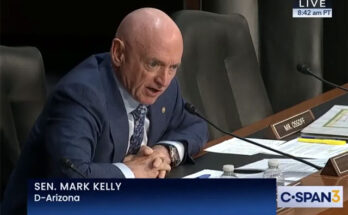By Ella Anderson/Cronkite News
WASHINGTON – House Republicans sent President Donald Trump the megabill he has sought Thursday, shrugging aside a last-ditch Democratic effort to shame them over massive Medicaid cuts and a huge deficit impact.
Only two Republicans broke ranks on the “One Big Beautiful Bill,” which includes huge spending cuts and even bigger tax cuts.
All six Arizona Republicans supported the measure. Both Democrats opposed it.
“It’s a bill I’m proud to support,” Rep. Juan Ciscomani, a Tucson Republican, said after the vote.
The bill cuts federal Medicaid spending by $930 billion. The nonpartisan Congressional Budget Office estimates it will push 12 million people off Medicaid. Other analysts expect it to force many rural health care facilities to close.
Rep. Greg Stanton, a Phoenix Democrat, accused Republicans of “closing their eyes” to the impact on their constituents, especially those in rural areas.
“They’re going to regret this vote,” he said. “Not just politically, but on a moral level.”
Ciscomani downplayed concerns about the Medicaid cuts, asserting the changes will strengthen the program’s fiscal viability “and protect it for the people that need it the most.”
The 218-212 vote by bleary-eyed lawmakers came after a grueling all-night debate.
Just last week, Ciscomani was one of 16 Republicans who penned a letter to Senate Majority Leader John Thune and House Speaker Mike Johnson, warning that the Senate version — the one the House finalized without changes — slashed Medicaid too deeply.
“Protecting Medicaid is essential for the vulnerable constituents we were elected to represent. Therefore, we cannot support a final bill that threatens access to coverage or jeopardizes the stability of our hospitals and providers,” they wrote.
New York Rep. Hakeem Jeffries, the Democratic minority leader, called out Ciscomani as he read the letter during a marathon 8-hour, 44-minute floor speech.
If they felt so strongly, he said, ”This should be a ‘hell no’ vote” for them.
Republicans touted the bill for delivering the most significant tax cuts in history, ending decades of growth in a costly social safety net, cutting subsidies for green energy, and boosting funds for immigration enforcement.
More than 2.1 million people are enrolled in Arizona’s Medicaid program, known as the Arizona Health Care Cost Containment System, including 754,600 children, 194,040 seniors, and 172,480 people with disabilities, according to KFF.
An analysis from the Robert Wood Johnson Foundation released on Tuesday found that the impending cuts would result in 234,000 people being removed from Medicaid in Arizona, ranging from 23,000 in the district of Rep. Greg Stanton, D-Phoenix, to 31,000 in the district held by Rep. Eli Crane, R-Oro Valley.
Democrats view Crane, Ciscomani, and Rep. David Schweikert of Fountain Hills as vulnerable in next year’s midterm elections. All expressed qualms about the megabill but supported it anyway.
“They will always prioritize serving Republicans’ billionaire campaign donors at the expense of the children, families, and workers they’re supposed to represent,” said Rep. Suzan DelBene of Washington, chair of the Democrats’ House campaign arm.
The Congressional Budget Office projects the bill will add $3.3 trillion to the national debt over the next decade. Other estimates top $5 trillion. That’s because it extends the 2017 tax cuts and adds new ones that will also eat into federal revenue, more than offsetting cuts to green energy subsidies, food stamps, Medicaid, and other programs.
Schweikert, a self-proclaimed deficit hawk who regularly delivers floor speeches railing against federal red ink, was clearly unhappy about the massive new deficit spending.
“We need to step back and start having the honest conversation. … That’s the problem — we want the sugar high. None of us want the (fiscal) discipline,” he told Cronkite News.
A short time later, he cast his vote with other Republicans.
“Rep. David Schweikert is doing exactly what he promised: delivering real results, restoring fiscal sanity and fighting for Valley families,” said Ben Petersen, spokesman for the Republican Party’s House campaign arm.
Asked why he changed his mind, Ciscomani said, “Changed my mind? The bill has a lot of advantages, a lot of benefits.”
The Senate increased a fund for rural hospitals from $25 billion to $50 billion, although the National Rural Health Association estimates that it will only offset two-thirds of the cuts.
The final bill also delays a cap on taxes that states use to finance their share of the program.
“That wasn’t there before. This is completely new,” Ciscomani said. “I’m going to be working hard to bring those funds home.”
Jeffries’ marathon speech set a new record in the House, which has no filibuster but allows party leaders unlimited floor time.
At one point, he read a letter from one of Ciscomani’s constituents, Victoria Fuller from Sierra Vista.
Fuller and her husband served in the Army, and both have disabilities from their service. With a modest income from an electrical contracting business, they rely on Medicaid for help with an adopted son with autism, one of their five children.
“Slashing Medicaid will have especially dire consequences for rural communities like ours, forcing hospitals to close,” Jeffries read from her letter. “Health resources are already slim in our area. … President Trump is causing enormous stress and hardship for families like mine. He and his billionaire friends don’t need more tax breaks. It’s outrageous. The last thing we should be considering is cutting Medicaid. These programs are lifelines.”
“We agree with you, Victoria,“ Jeffries said.
Nurses and other health care workers gathered outside Ciscomani’s office in Tucson on Tuesday to protest the Medicaid cuts.
Crane’s district, the biggest in the state, covering all of northeast Arizona, has 275,300 residents on Medicaid —roughly a third of the population.
Of the five rural hospitals flagged by University of North Carolina researchers as being at risk for closure due to the Medicaid cuts, three are in Crane’s district.
He declined repeated attempts to discuss the impacts on his district and its hospitals.
Rep. Paul Gosar’s district has 233,600 Medicaid enrollees.
The Bullhead City Republican has been steadfast in his support for the bill. After it passed, he said it would deliver “historic tax relief to middle-class Americans, reigns in wasteful spending (and) restores fiscal sanity.”
He also touted a provision that revives a compensation program for uranium workers and people who lived downwind of U.S. nuclear tests.
“I was always a yes,” he said following the vote. “There isn’t really any Medicaid cuts.”
Gov. Katie Hobbs, a Democrat, wrote to the state’s six GOP lawmakers in Congress on Monday, imploring them to oppose the bill and warning that 220,000 Arizonans would lose Medicaid coverage.
“Any version of this bill that rips health care away from hundreds of thousands of Arizonans, slashes nutrition assistance for working families, and guts rural hospitals to pay for tax cuts for the already wealthy is unacceptable,” Hobbs wrote.
The House approved its version of the megabill on May 22 by a single vote, with two GOP defections. Schweickert missed the predawn vote after falling asleep but said he would have voted with his party.
Senate Republicans approved a somewhat amended version on Tuesday with three defections. Vice President JD Vance cast a tie-breaking vote to send the measure back to the House for final approval.
House Republicans fended off Democratic amendments that would have required another round of negotiations with the Senate.









